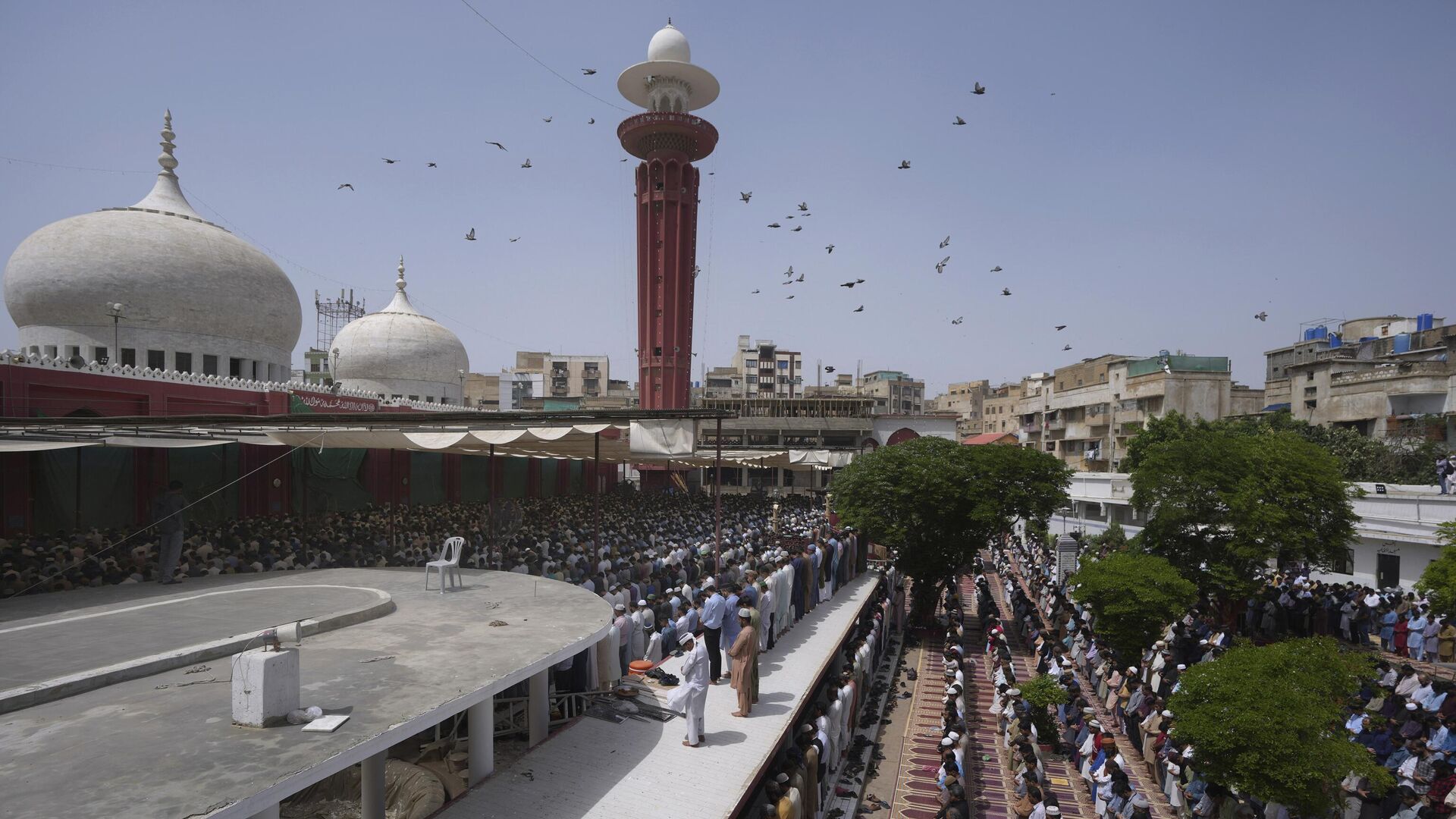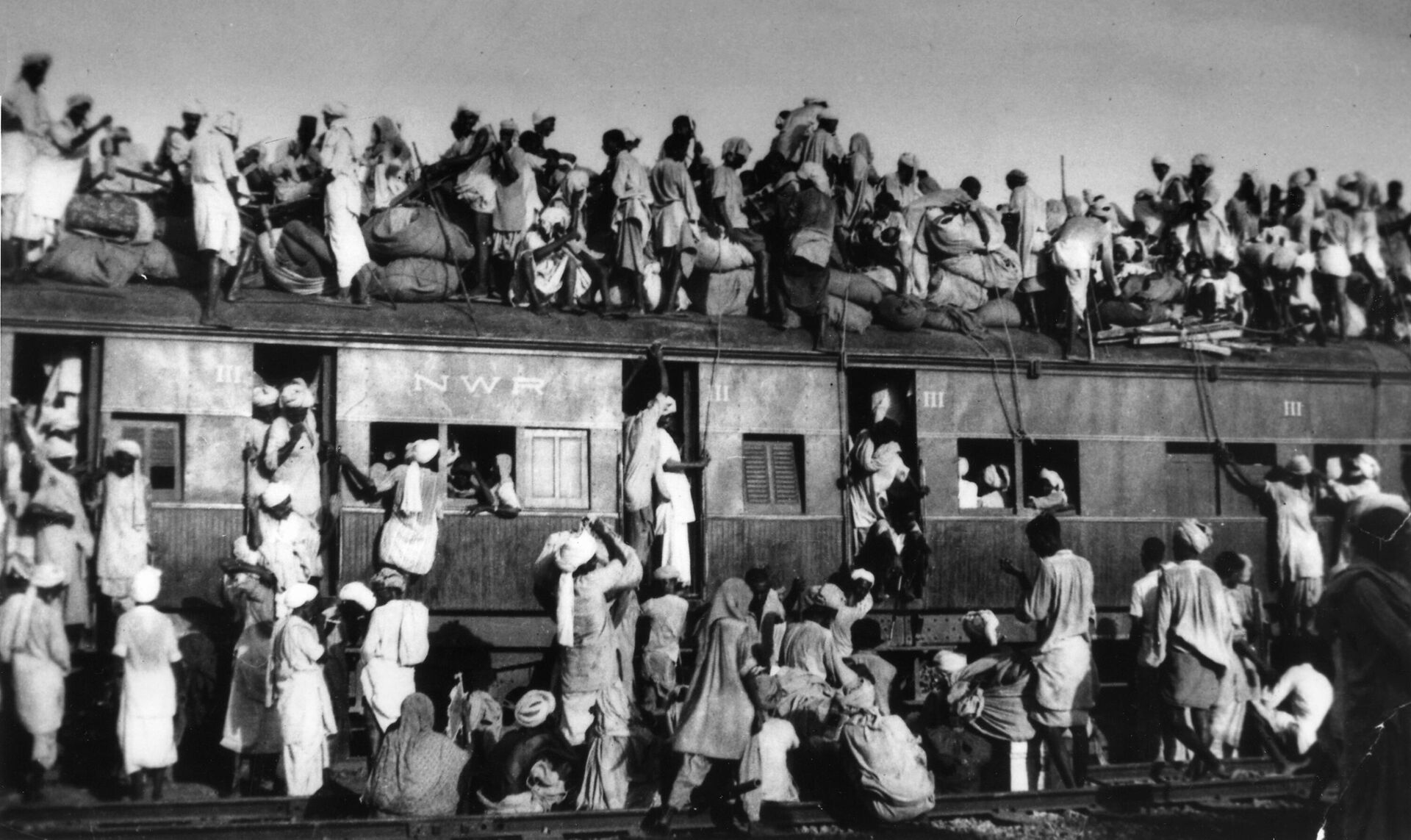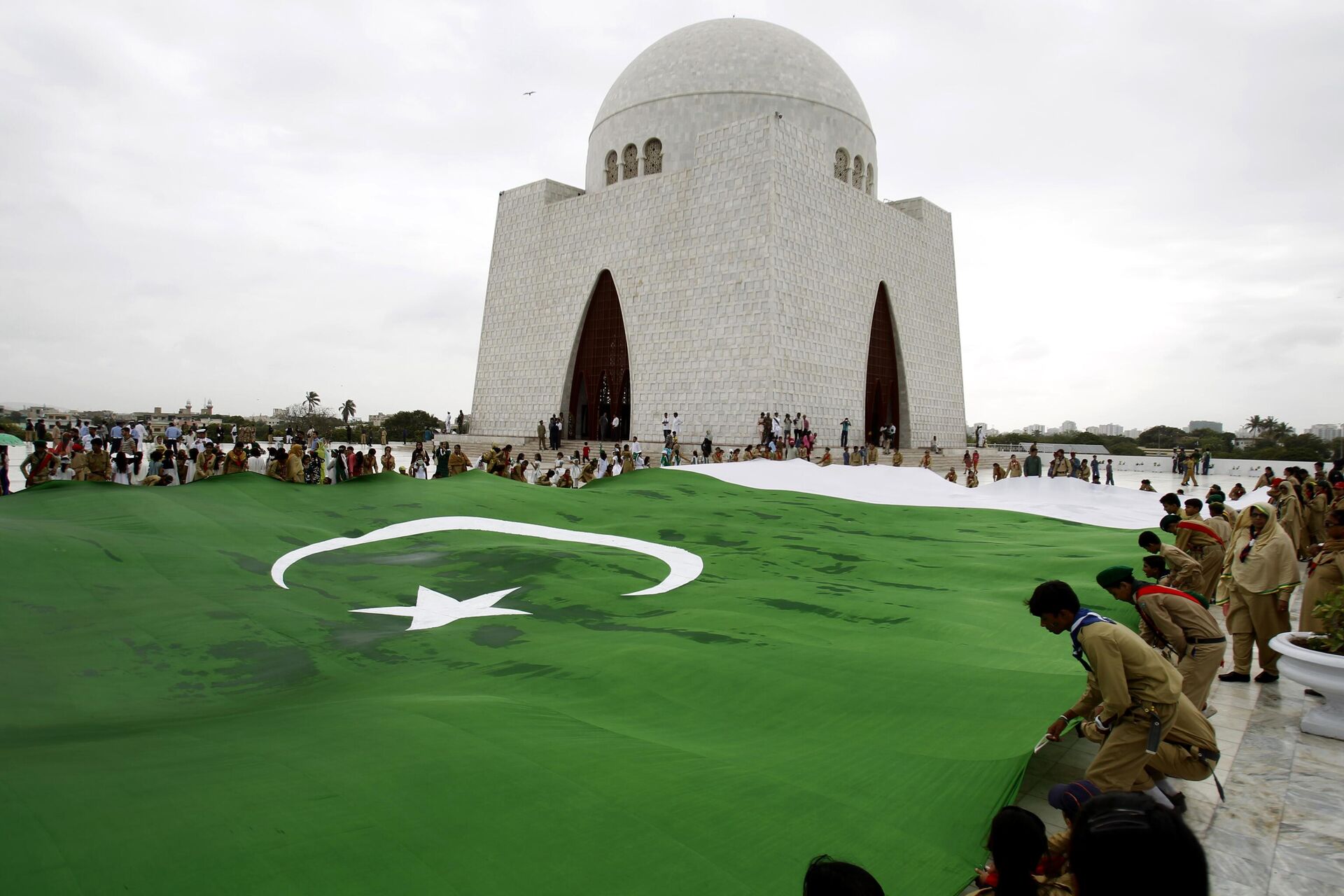https://sputniknews.in/20230814/pakistan-independence-day-the-birth-of-nation-3581240.html
Pakistan Independence Day: The Birth of a Nation
Pakistan Independence Day: The Birth of a Nation
Sputnik India
Pakistan proudly its Independence Day on August 14, marking the day it emerged as a sovereign nation in 1947. This historic event led to the birth of Pakistan as a nation.
2023-08-14T14:50+0530
2023-08-14T14:50+0530
2023-08-14T17:46+0530
pakistan
south asia
muslim
independence day
celebration
national identity
british raj
india
partition of india
terrorist attack
https://cdn1.img.sputniknews.in/img/07e7/03/18/1294395_0:0:3073:1728_1920x0_80_0_0_998bcb199f70f8b65fa88dd04e5130f1.jpg
The partition of British India in 1947, which gave birth to India and Pakistan, was a complex and tumultuous process. Driven by religious and political aspirations, the demand for a separate Muslim homeland gained momentum, with leaders such as Muhammad Ali Jinnah championing the cause.Sputnik India takes a look at the foundation of modern Islamic Republic of Pakistan.What Happened on 14 August 1947?Pakistan came into existence as a result of the Pakistan Movement, which aimed to create an independent Muslim majority state in the north-western regions of British India via partition. The independence of the country was declared on 14 August 1947.This partition revived feelings of alienation among Muslims, giving rise to the spirit of nationalism and laying the foundation for Pakistan's birth. This nationhood was forged in the crucible of sacrifice and struggle as millions of Muslims across the Indian subcontinent rallied together braving countless hardships.The relentless efforts of political activists, freedom fighters, and the masses culminated in the creation of Pakistan. This newfound sense of national identity provided hope, ambition, and the determination to build a nation that would stand on the principles of democracy, freedom, and faith.Two-Nation Theory and Ideological FoundationsPakistan's nationhood is deeply rooted in the Two-Nation Theory, which argued that the Hindus and Muslims of the subcontinent comprised two separate nations, distinct in their cultural, religious, and political beliefs.This theory provided an ideological foundation for the newly formed country, highlighting the necessity of a Muslim majority homeland to safeguard the rights and interests of its people. Hence, when the British Raj over the Indian Subcontinent came to an end, Muslims wanted a separate homeland from Hindus.The resilience of the Two-Nation Theory, pre and post-independence, helped solidify Pakistan in the face of numerous challenges and setbacks.Pakistan, as a country, comprises a vibrant tapestry of cultures, languages, and ethnicities. It thrives on celebrating this rich diversity, promoting national unity, and embracing a shared heritage that transcends regional disparities.The national language, Urdu, acts as a unifying force, while the rich traditions of music, arts, literature, and festivals further contribute to the colorful mosaic of Pakistan's nationhood. This unity in diversity can be seen on the Day of Independence each year, when school children dress up in the national dresses of Punjab, Balochistan, Sindh, KPK etc., singing regional songs, but united by one national anthem.Drawbacks and Impact on Nation-BuildingPakistan's nationhood has been tested by numerous internal and external challenges. Political turmoil, socio-economic issues, regional conflicts, and terrorism have threatened its core values.Nevertheless, the struggle for a separate homeland has rejuvenated the spirit of the nation, leading hope and determination to prevail over such challenges. It has empowered Pakistanis to work towards a brighter future, seeking socio-economic progress, educational reforms and interfaith harmony.Pakistan's Independence Day serves as a touching reminder of its birth as a nation and the origins of its nationhood. Rooted in the Two-Nation Theory, this provides a firm basis for unity, diversity, and resilience.Pakistanis around the world commemorate this day with pride, vowing to uphold their nation's ideals of freedom, faith and progress. People tend to dress up in the colors of Pakistan’s flag, green and white, and visit national monuments like Minar-e-Pakistan and Muhammad Ali Jinnah’s Mausoleum.The bazaars come alive with patriotic souvenirs, memorabilia, and national flags. Concerts and festivals are organized across the cities, where people get together to celebrate. Many local channels show patriotic films and dramas evoking memories of the struggles that Pakistanis had to face to achieve a separate homeland.
pakistan
south asia
india
Sputnik India
feedback.hindi@sputniknews.com
+74956456601
MIA „Rossiya Segodnya“
2023
Aneela Rashid
https://cdn1.img.sputniknews.in/img/07e6/0c/0d/74548_0:0:485:484_100x100_80_0_0_821526e967ae85d041e2d30ee34fa1de.jpg
Aneela Rashid
https://cdn1.img.sputniknews.in/img/07e6/0c/0d/74548_0:0:485:484_100x100_80_0_0_821526e967ae85d041e2d30ee34fa1de.jpg
News
en_IN
Sputnik India
feedback.hindi@sputniknews.com
+74956456601
MIA „Rossiya Segodnya“
Sputnik India
feedback.hindi@sputniknews.com
+74956456601
MIA „Rossiya Segodnya“
Aneela Rashid
https://cdn1.img.sputniknews.in/img/07e6/0c/0d/74548_0:0:485:484_100x100_80_0_0_821526e967ae85d041e2d30ee34fa1de.jpg
pakistan independence day, happy independence day pakistan, independence day pakistan, 75th independence day of pakistan, pakistan independence day year, pakistan independence day quotes, happy independence day pakistan 2022, independence day of pakistan, independence day quotes pakistan, quotes about independence day of pakistan, 76 years of pakistan independence, happy independence day pakistan, 76th independence day of pakistan, pakistan 76th independence day, pakistan independence day year, pakistan independence day, pakistan independence day quotes, independence day quotes of pakistan, founder of pakistan, who is the founder of pakistan,
pakistan independence day, happy independence day pakistan, independence day pakistan, 75th independence day of pakistan, pakistan independence day year, pakistan independence day quotes, happy independence day pakistan 2022, independence day of pakistan, independence day quotes pakistan, quotes about independence day of pakistan, 76 years of pakistan independence, happy independence day pakistan, 76th independence day of pakistan, pakistan 76th independence day, pakistan independence day year, pakistan independence day, pakistan independence day quotes, independence day quotes of pakistan, founder of pakistan, who is the founder of pakistan,
Pakistan Independence Day: The Birth of a Nation
14:50 14.08.2023 (Updated: 17:46 14.08.2023) Pakistan proudly celebrates its Independence Day on August 14, marking the day it emerged as a sovereign nation in 1947. This historic event led to the birth of Pakistan as a nation.
The
partition of British India in 1947, which gave birth to India and Pakistan, was a complex and
tumultuous process. Driven by religious and political aspirations, the demand for a separate Muslim homeland gained momentum, with leaders such as
Muhammad Ali Jinnah championing the cause.
Sputnik India takes a look at the foundation of modern Islamic Republic of Pakistan.
What Happened on 14 August 1947?
Pakistan came into existence as a result of the Pakistan Movement, which aimed to create an independent Muslim majority state in the north-western regions of British India via partition. The independence of the country was declared on 14 August 1947.
This partition revived feelings of alienation among Muslims, giving rise to the spirit of nationalism and laying the foundation for Pakistan's birth. This nationhood was forged in the crucible of sacrifice and struggle as millions of Muslims across the Indian subcontinent rallied together braving countless hardships.
The relentless efforts of political activists, freedom fighters, and the masses culminated in the creation of Pakistan. This newfound sense of national identity provided hope, ambition, and the determination to build a nation that would stand on the principles of democracy, freedom, and faith.
Two-Nation Theory and Ideological Foundations
Pakistan's nationhood is deeply rooted in the
Two-Nation Theory, which argued that the
Hindus and
Muslims of the subcontinent comprised two separate nations, distinct in their cultural, religious, and political beliefs.
This theory provided an ideological foundation for the newly formed country, highlighting the necessity of a Muslim majority homeland to safeguard the rights and interests of its people. Hence, when the British Raj over the Indian Subcontinent came to an end, Muslims wanted a separate homeland from Hindus.
The resilience of the Two-Nation Theory, pre and post-independence, helped solidify Pakistan in the face of numerous challenges and setbacks.
Pakistan, as a country, comprises a vibrant tapestry of cultures, languages, and ethnicities. It thrives on celebrating this rich diversity, promoting national unity, and embracing a shared heritage that transcends regional disparities.
The national language, Urdu, acts as a unifying force, while the rich traditions of music, arts, literature, and festivals further contribute to the colorful mosaic of Pakistan's nationhood. This unity in diversity can be seen on the Day of Independence each year, when school children dress up in the national dresses of Punjab, Balochistan, Sindh, KPK etc., singing regional songs, but united by one national anthem.
Drawbacks and Impact on Nation-Building
Pakistan's nationhood has been tested by numerous internal and
external challenges. Political turmoil, socio-economic issues, regional conflicts, and
terrorism have threatened its core values.
Nevertheless, the struggle for a separate homeland has rejuvenated the spirit of the nation, leading hope and determination to prevail over such challenges. It has empowered Pakistanis to work towards a brighter future, seeking socio-economic progress, educational reforms and interfaith harmony.
Pakistan's
Independence Day serves as a touching reminder of its birth as a nation and the origins of its nationhood. Rooted in the Two-Nation Theory, this provides a firm basis for unity, diversity, and resilience.
Pakistanis around the world commemorate this day with pride, vowing to uphold their nation's ideals of freedom, faith and progress. People tend to dress up in the colors of Pakistan’s flag, green and white, and visit national monuments like Minar-e-Pakistan and Muhammad Ali Jinnah’s Mausoleum.
The bazaars come alive with patriotic souvenirs, memorabilia, and national flags. Concerts and festivals are organized across the cities, where people get together to celebrate. Many local channels show patriotic films and dramas evoking memories of the struggles that Pakistanis had to face to achieve a separate homeland.




